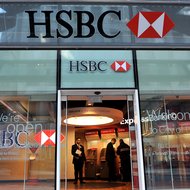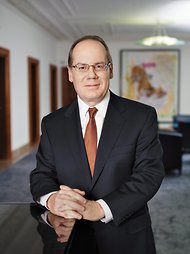 Andy Rain/European Pressphoto AgencyA branch of HSBC in London. Britain’s tax authority is investigating more than 4,000 accounts in the British crown dependency of Jersey.
Andy Rain/European Pressphoto AgencyA branch of HSBC in London. Britain’s tax authority is investigating more than 4,000 accounts in the British crown dependency of Jersey.
LONDON – HSBC, Britain’s biggest bank, said on Monday that net profit fell 17 percent last year because of a record fine to settle money laundering charges and changes related to the value of its own debt.
Profit fell to $13.5 billion from $16.2 billion in 2011, failing to meet analysts’ expectations. The bank also missed its own target of return on equity of 12 to 15 percent. Its shares fell 2.6 percent in early trading in London on Monday.
Douglas J. Flint, HSBC’s chairman, said in a statement that last year was “a difficult one for all at HSBC as we addressed the restructuring of the firm against a lower-growth economic backdrop and with legacy issues and regulatory challenges imposing a further set of imperatives.”
The bank’s chief executive, Stuart T. Gulliver, added that he expected the market environment to remain “difficult,” but that HSBC would benefit from growth of the economies in China and the United States even if European markets continued to struggle.
To fulfill his pledge to increase profitability, Mr. Gulliver took the bank out of some markets, sold business divisions and eliminated jobs. HSBC has closed or sold 46 businesses and investments since 2011, including four this year. The bank sold its stake in Ping An Insurance of China for $9.4 billion and offloaded its credit card unit in the United States to Capital One Financial for $2.6 billion. HSBC also sold its unit in Panama to Bancolombia for $2.1 billion last month.
In December, HSBC agreed to a record $1.92 billion fine to settle charges with American authorities that the bank breached rules against money laundering, including that it handled money transfers worth billions of dollars for countries under United States sanctions.
HSBC, based in London, generates more than half of its profit in Asia. Growth in China has helped the bank compensate for shrinking or slower-growing income in Europe since the beginning of the financial crisis. Europe was the only region where HSBC’s earnings declined last year.
The bank said it had made solid progress on gradually reducing the size of its consumer lending and mortgage portfolio in the United States. HSBC’s fastest-growing business last year was its retail banking and wealth management operation.
HSBC added that it planned to increase the first three interim dividends this year by 11 percent.
Article source: http://dealbook.nytimes.com/2013/03/04/hsbc-annual-profit-falls-on-money-laundering-charges/?partner=rss&emc=rss

